This post may contain affiliate links.
Have you ever found yourself in need of a reliable, backup power source – at home, during emergencies, or when camping? A portable car generator can transform your vehicle into a backup generator that converts the electric energy produced by your car or truck, into electricity you can use for items you would normally plug into a household power outlet. In a nutshell, it’s a weatherproof pure sine inverter that you can use anytime, anywhere, for charging cell phones, computers, televisions, e-bike batteries, refrigerators, and even some household cooking appliances!
Over the years, we’ve used all kinds of power solutions. From RVs with an onboard generator, lithium batteries and solar; to a camper with a portable generator, folding solar panel, and portable charging stations. Each has their unique features, pros, cons, and price points, depending on your needs.
Now, we’re putting a CarGenerator to the test to share the features, benefits, and what makes it useful in almost any situation.
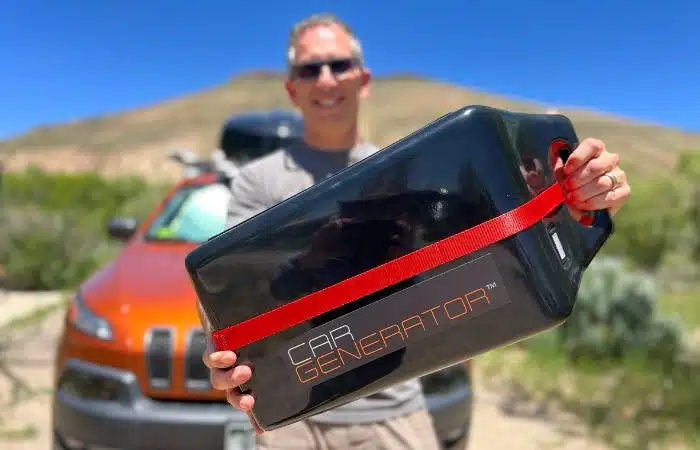
Demo Testing a CarGenerator as backup power supply
In this post, we delve into how a car generator works, its advantages over solar and gas generators, and why it has become a popular choice among RVers, car campers, and homeowners alike. Whether for everyday use, or emergencies. Let’s explore the world of car generators and discover the benefits and possibilities of unlocking this simple yet powerful new level of power supply, from your vehicle!
Spoiler alert: With no installation required, this device is a game changer with impressive capabilities, as a lightweight, maintenance-free power solution that is eco-friendly and easy to use.
Save up to $400 on a CarGenerator with exclusive “RVLOVE” coupon codes.
Quick Links to what we cover in this post:
- What is a car generator? How it works? How much power?
- What are the many uses for a car generator?
- When car generators are better than solar generators?
- Benefits of car generator vs gas generator?
- Demo: Our experience testing the CarGenerator AW1000
- Specs, Price and Discounts
- Which model car generator is best for you?
- What’s our verdict on the CarGenerator?
- Save up to $400 with RVLOVE discount coupon codes
- Conclusion
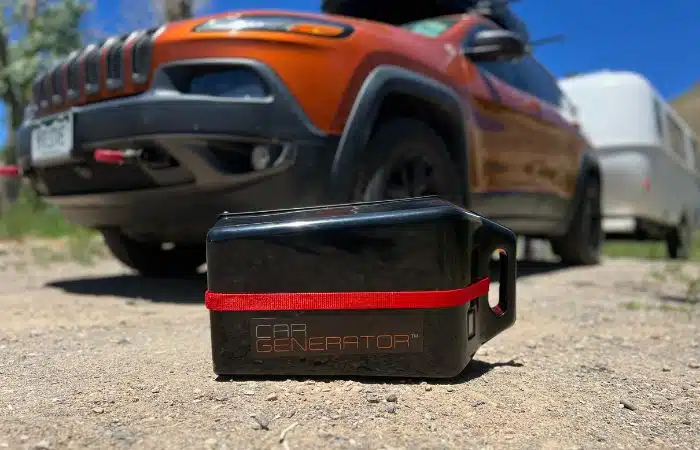
What Is A Car Generator?
Acting as an electronic power-converting tool, a car generator harnesses the electric energy produced by your vehicle and converts it into usable electricity. Similar to what you would get from a household power outlet.
Whether you’re looking for a backup power solution at home, in case of emergencies, heading out on an RV adventure, car camping, tent camping, or on a road trip, a CarGenerator allows you to stay comfortable and connected, just as if you were plugged into a traditional power grid.
How does a CarGenerator work?
It’s amazingly simple: 1) Start your engine. 2) Hookup CarGenerator 3) You have power for up to 80 hours.
But let’s explain a bit more. Cars and trucks have alternators that normally charge their own battery and power all of the 12-volt power for the vehicle when the engine is running. A car generator attaches to the battery terminals or other power terminals and collects some of this 12-volt electricity produced by the alternator. The power is inverted into clean, pure-sine, household 120-volt AC power and made available to power items by plugging them into the household-style outlet of the car generator.
All of the electronics are housed inside weather-resistant housing that hangs outside of the engine bay. So it is safe to use in almost any weather without monitoring. One of the advantages of car generators is they are small and lightweight, which makes them easy to store and transport. They don’t require any maintenance, which means they are always ready to put to use.
How much power does a CarGenerator generate?
The amount of power delivered depends on the alternator output of your vehicle, as well as which model CarGenerator you are using. But most CarGenerators consistently produce at least 1,000 watts of power, which is equivalent to small portable gasoline generators. More on that below.
The most expensive, heavy, and complex parts of a generator – such as an engine, alternator, fuel tank, etc – are already in your vehicle. That’s when the inventor of the CarGenerator asked the question: “Why not make use of what I already have in my vehicle to create power?” He then developed a range of CarGenerators of different sizes and capabilities to do just that.
Oh, and in case you are wondering. CarGenerators are not only for gas and diesel trucks. They work well with hybrid and fully electric vehicles too.
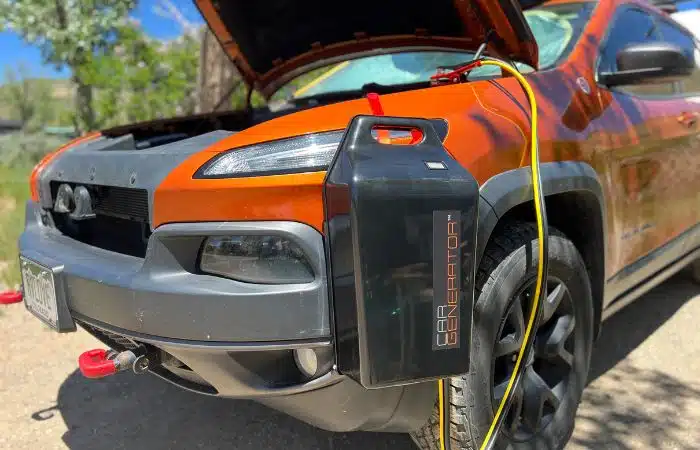
The Many Uses for a CarGenerator
The primary purpose of having a car generator is to provide portable power anywhere and anytime, whether it is for emergencies, home, travel, outdoor, or recreational. And regardless of weather conditions or time of day. The car generator works day and night in all weather conditions, rain, hail, snow, wind, sunshine, cloud, and shade. And provides power for up to 80 hours.
What can you charge with a CarGenerator?
As long as the watts are within the rating of your CarGenerator (in this case, the AW1000 model, which has 1,000 watts), the list of what you can power is endless.
Charge items like cell phones, laptops, desktop computers, gaming devices, drones, GoPro, cameras, audio equipment, internet routers, StarLink, TVs, portable charging stations, e-bike batteries, electric coolers, ice makers, blenders, home refrigerators, the batteries of your RV, even some cooking and heating equipment!
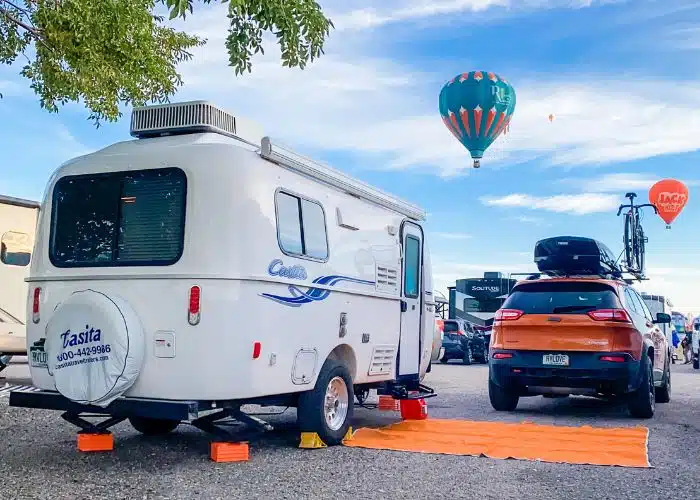
Where can you use a CarGenerator?
Anywhere you take your vehicle, you can use your CarGenerator! Here are a few scenarios.
At Home: Car generators were first invented as backup power for homes, say when the power goes out. If your home loses power, you could simply start your car, connect your CarGenerator, and plug-in critical household appliances like your refrigerator or maybe even your heating furnace. We’ll explain how we have used a car generator at home in a moment.
RVs and Campers: Car generators are now gaining popularity with RVers and campers because they are such a fantastic source of backup power generation. If you are staying in your RV outside of an RV park – say at an RV rally, event, or boondocking, you will need to rely on the limited battery capacity of your RV. Some RVers have built-in generators. Some have portable generators powered by propane, gas, or diesel. And some RVers invest in expensive solar and battery upgrades to provide more power.
If you don’t have upgraded solar and batteries, or a built-in generator, you will probably need another power source to maximize your adventures. And if you can’t get enough sun for solar because you’re in a shady area or experiencing cloudy days, your solar won’t generate much (or any) electricity to store in your RV batteries.
That’s why many RVers carry a gasoline-powered generator to supplement their power needs. But these can be noisy, smelly, require maintenance, and are more difficult to transport. CarGenerator can charge your RV batteries 10x faster than solar panels (comparing 1000-watt CarGenerator vs 100-watt solar panels).
Car Camping, Tenting, and Road Trips. A car generator can be an ideal and portable power solution for car camping, tent camping, road tripping, and hunting. It takes up very little space and can provide seemingly unlimited power for short trips away. A CarGenerator allows you to power virtually anything you would be bringing along in your car or truck.
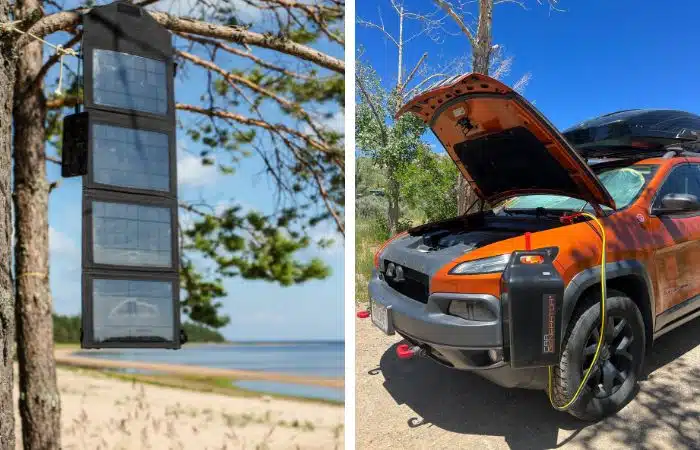
CarGenerators Vs Solar Generators
Portable solar generators are popular and great for small power needs as long as the sun is out. However, a car generator offers much more power generation capacity and for longer amounts of time while also taking up less space and weight. So, when space and weight are important, why not have a more capable and diverse power generator provided by a car generator?
One advantage of a solar generator over a car generator is the extra portability if you want power far away from your car. But that also means carrying heavy and bulky gear if you need more than minimal power.
It is great to be completely quiet and environmentally friendly using solar power, but a car generator can provide more power for longer, especially on cloudy days or if you’re in the shade.
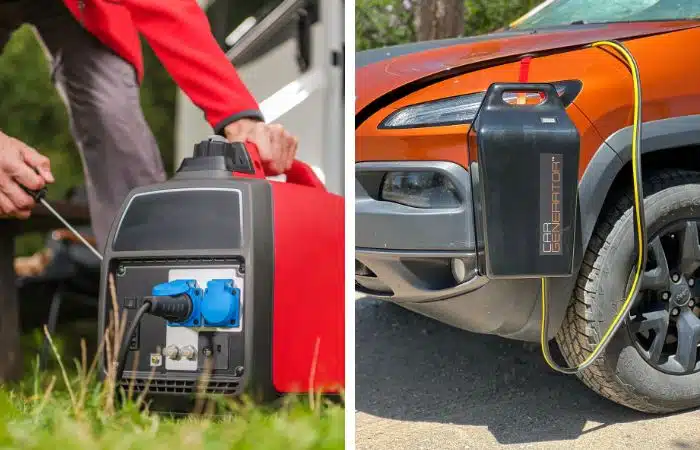
Benefits of CarGenerator Vs Gas Generator
Car generators make the most of your vehicle’s existing engine, fuel tank, and power-generating potential. This avoids doubling up on having those same components in a portable gasoline generator. Let’s review the top six reasons car generators are better than portable gasoline generators.
1. Maintenance-free
Gas generators require oil changes, keeping the fuel fresh, draining fuel if stored for long periods, and many more moving parts that can experience wear and tear. Also, altitude can impact the operation of gasoline generator engines, which might need adjustments to operate. Car generators are solely electronic. So they can easily be stored away and are ready at any moment with zero maintenance, and modern vehicle engines are easier to start and automatically adjust for altitude.
2. Lightweight, portable, and easy to transport inside
The most popular car generator (the AW1000) only weighs 11 pounds and is compact in size. It’s the size of a small backpack and easy to handle. Since it doesn’t use fuel or have an exhaust, it can be stored safely anywhere inside the vehicle’s passenger compartment. No need to carry a secondary fuel tank from a gas generator or deal with the smell of fuel or exhaust stinking up the inside of our vehicle.
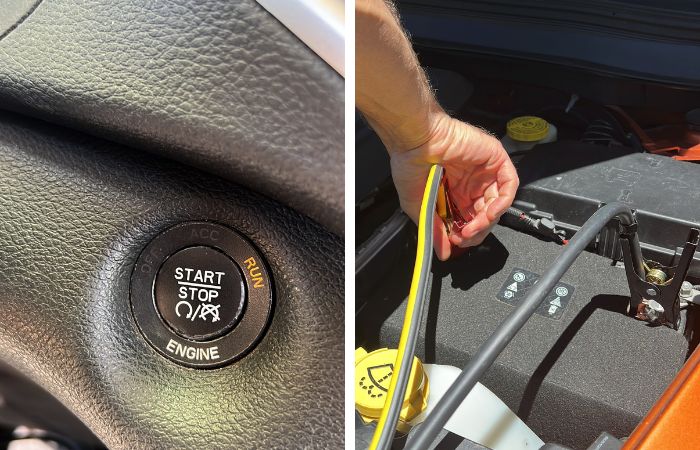
3. Simple to Use
No need to figure out dials, switches, or pull start the generator engine. Just hang the CarGenerator with the included strap, start your car engine, connect the large alligator clips to your car’s battery terminals, and you are ready to go. Higher power output versions of the car generator, providing over 2,000 watts of continuous power, have wires that semi-permanently attach to the battery, then use a quick connection to connect the car generator. This provides a more secure connection and is quicker for more regular use.
4. No separate fuel tank
This is a two-fold benefit. As mentioned above, you don’t need to transport an extra fuel tank. But you also can use the large fuel tank for your car or truck instead of the tiny fuel tank of the portable gasoline generator. This means you have a much longer run time, and your fuel stays fresh since it is an engine you run more frequently.
5. Fewer emissions
Portable gasoline generators have little or no emission standards. Car and truck engines have extensive emissions requirements. So, using your vehicle’s engine is cleaner energy than running gasoline generators. Far less exhaust smell too.
6. Far quieter and runs longer
Like the emissions, the exhaust system on cars and trucks is much quieter than the exhaust of a small generator. This means you are far less likely to offend your neighbors (whether camping or at home) when using your car generator.
Knowing you are not bothering people also makes you feel less anxious about letting it run for longer periods if you need to recharge your RV or power-heavy draw electronics for extended periods.

Demo: Testing the CarGenerator AW1000
While there are several models available, the most popular is the AW1000. It is very capable, compatible with most vehicles, and delivers sufficient power to satisfy most people’s needs. This is the unit CarGenerator sent to us for demo testing and review. Here’s our experience, comparing it with other power sources we’ve used over the years – at home and with our RV and car.
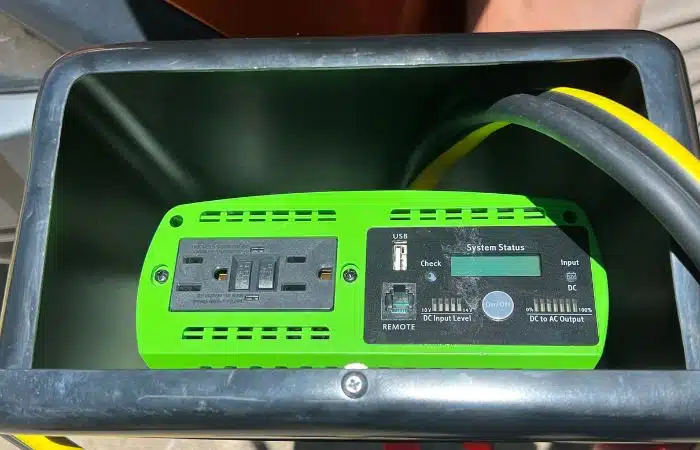
Powering and charging an RV
It was quick and simple to connect the CarGenerator cables to the battery terminals of our Jeep Cherokee Trailhawk. There are several outlet options, and we were able to plug the RV electrical cable into that using an adapter.
The CarGenerator provided similar power from our Jeep engine (compared to our gas generator) with virtually no noise and could charge up the RV battery. The CarGenerator takes up a fraction of the space and weight of our previous Honda EU2200i generator that we used as backup power for our Casita camper.
The Honda was a great generator that powered everything in our camper. However, transporting it was a hassle due to its weight of 44 pounds and the need for an extra fuel tank since we don’t have an open truck bed.
Whenever we weren’t using it for extended periods, we had to either drain the fuel or use a stabilizer. Monitoring, maintenance, and oil changes were required. And while it was quiet at idle, it became much louder when we needed extra power. In some camping areas, we had to place it on an elevated table, which made us nervous in case it fell and increased the fire risk from hot engine parts near the ground.
I really like that the CarGenerator is less than a quarter of the weight AND size of the gas generator when you consider the need for the extra fuel tank. There’s no concern about leaving the CarGenerator in the Jeep at all times, as there is no smell or risk of leaking fuel. Plus, there is zero maintenance. I like the convenience of carrying the CarGenerator so we can power electronics, appliances, tools, compressors, and charge devices when out exploring.
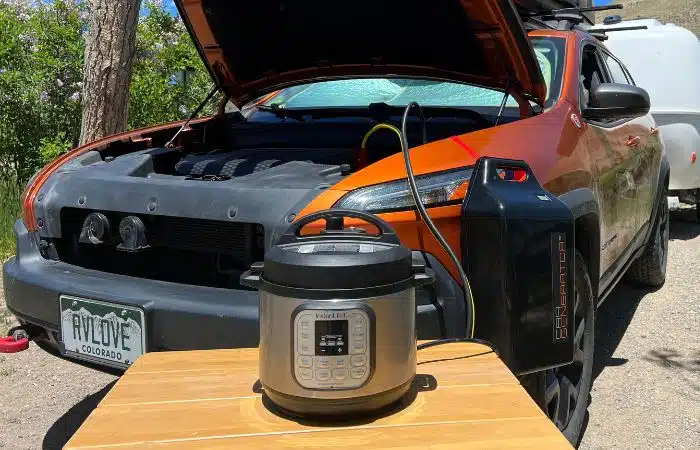
Cooking with electric appliances via CarGenerator
I figured a good way to test the capabilities of the CarGenerator would be with a cooking appliance. We love our 3-quart InstantPot, which uses 700 watts. The 6-quart Instant Pot uses 1,000 watts. However, the CarGenerator AW1000 can run either the 3-quart or 6-quart Instant Pot comfortably with our Jeep idling. We understood the biggest power draw of an InstantPot to be when getting up to pressure, but we didn’t actually notice a change in the power delivery between the InstantPot pressurizing and cooking.
You can monitor the power delivery on the CarGenerator by checking the volts produced on the digital screen. The readout should maintain between 13.3 and 14.3 volts, depending on how much electric load. If it shows 13.2 or less, you must reduce the electricity load plugged in. But it did just fine with our Instant Pot test! Our tea kettle and toaster each use about 1,000 watts. And while we didn’t test them, we could run either of those too.
Remember, some household appliances pull 1,500–1,800 watts, especially if they involve heating. For example, our electric fireplace at home pulls 1,500 watts. So, to run anything over 1,000 watts continuously, you would need the higher output CarGenerator, as well as a bigger alternator in your vehicle.
I have to admit, it was pretty darn impressive watching our InstantPot cooking, simply from the power of our car!

Running appliances in our house with a CarGenerator
Fortunately, our home base is in a small Colorado town that isn’t subjected to hurricanes or tornadoes. While power is pretty stable and rarely goes out, if a big storm knocks out a major power line, it is certainly possible we could be without power for days. Especially as we’re not in a major metro area.
The CarGenerator lets us power our refrigerator and other household appliances for total peace of mind. Especially if the power outage happened during winter. Like most people, our home needs electricity to power our heat source. If you have gas furnaces or heating systems that don’t have big electricity power draws, you could use a car generator to help keep your home warm.
Our home uses electricity to heat water, which in turn heats the floors. We would not be able to power our primary heater with a CarGenerator. But our home is small (1,000sqf), so it could be heated enough to prevent damage to the heated floor system by simply running a small electric space heater on low. This could be sustained by a car generator combined with a vehicle with a high-output alternator.
We like the comfort of knowing we can power our house enough to keep us and everything inside safe, simply from the electricity created by our vehicle and the CarGenerator.
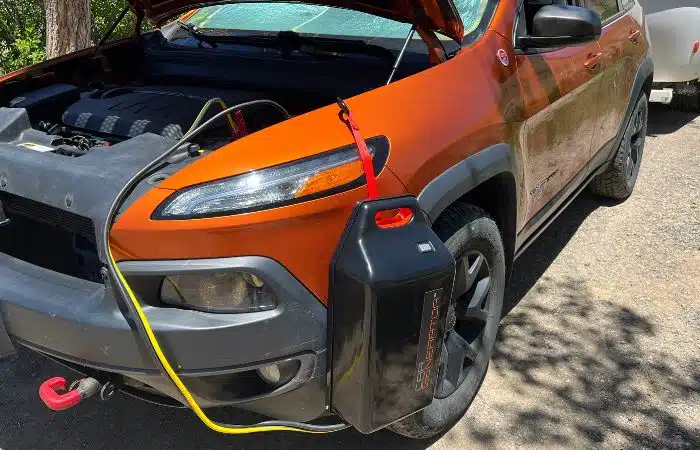
CarGenerator AW1000: Specs, Price, Discount
Here are the specs for the CarGenerator model AW1000 that we tested.
Dimensions: 21″ high x 12″ wide x 5.5″ deep
Weight: 11 pounds
Power: 1,000 watts continuous, 2,000 watts peak
The unit comes with two cables that attach to the vehicle’s battery terminal. And when not in use, it tucks neatly inside the opening at the bottom by the inverter/charger. It also has an adjustable strap and hook for mounting the CarGenerator on the side of your vehicle. It offers pure sine wave clean output power and professional pure copper high heat cables. So it is safe for continuous engine use, producing standard 120-volt household power.
How much is the CarGenerator A1000?
New CarGenerator AW1000:
$749 with RVLOVE150 discount code (reg. $899)
Factory Certified Refurbished:
$649 with RVLOVE250 discount code (reg. $899)
CarGenerator Home Integration Kit Bundle:
$1,197 (with RVLOVE400 discount code (reg. $1,597)
Every CarGenerator is made in North America and includes:
- FREE Shipping
- Ultra Care Extended three-year warranty
- FREE premium 365 live direct North American tech support by phone or video
- 90-day trial – love it or return it
- Money back guarantee
>>> Click here to buy – the RVLOVE discount is automatically applied
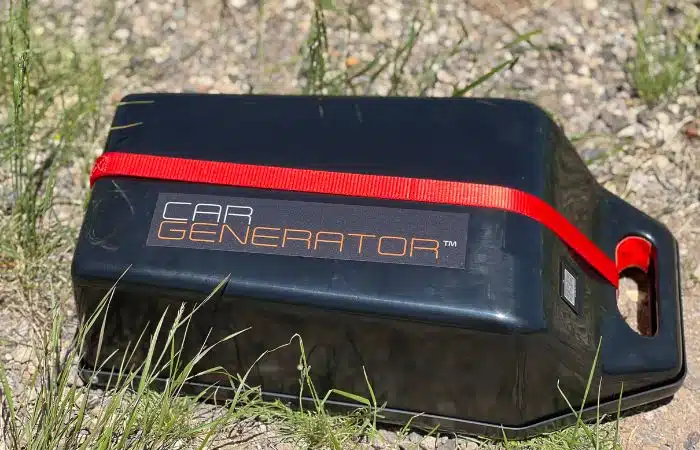
Which Model Car Generator Is Best For You?
As mentioned above, there is more than one model of car generator. The most popular unit is the AW1000 we tested, which provides a 1,000-watt continuous with 2,000-watt peak power output. This unit will easily meet the needs of most people. But there is also a car generator model that produces 2,000 continuous and 4,000 peak power. If you have big power needs and a vehicle with a high-output alternator, you might even opt for the 3,000-watt continuous, 6,000-watt peak generator.
How much power can the alternator in my car generate?
First, check your vehicle owner’s manual or research what your alternator is rated for. Reduce that rated number by half to account for the lower energy production produced at idle. Then multiply by 12 to achieve the watts.
For example, our Jeep has a 180-amp alternator. So 180 divided by 2 equals 90. Multiplying the 90 by 12 equals 1,080 watts. But if I run the engine at above idle, it will produce more power.
If I wanted to generate 2,000 watts consistently, I would need to have an alternator rated to produce at least 333 amps. But, since we primarily only use it to charge our RV battery or as backup power for appliances that use less than 1,000 watts continuously, the standard model car generator is plenty for us, especially since I don’t want to change the alternator in our Jeep or plan to get a new truck anytime soon.
But, if I already owned a truck with a higher output alternator, I would buy a higher output car generator to maximize the power output potential.

So What's My Verdict on the CarGenerator?
The CarGenerator AW1000 has proven to be a fantastic product for our backup power needs. I do prefer it over the Honda gas-powered generator we used to have, as I find the CarGenerator easier to store, maintain, transport, and use while still producing the power we need. Being so much easier to carry and operate would encourage us to use it more frequently.
Because running our Jeep is so quiet when using the CarGenerator, we know we are not offending neighboring RVers and campers with noise or fumes. And without a direct fuel source, it’s not a fire hazard either. Because of this, we can even use the CarGenerator in areas where other gas-diesel-propane-powered generators are not allowed. Regular generators are often limited in camping areas because of noise and fire safety concerns. But those limitations would not apply to a car generator.
For example, we’re attending the EclipseFest23 solar eclipse event in Oregon in October with our RV. Because the area has a high risk of fire danger, NO portable generators or open flames of any kind are allowed. But since the CarGenerator gets its power from your regular vehicle, it is much safer and therefore allowed at this event, as it doesn’t conflict with fire restrictions. (We checked with EclipseFest23 organizers, and they confirmed CarGenerators are allowed, per their rules).

Special “RVLOVE” Coupon Codes for Car Generator
As you can tell, we’re very impressed with this unit. Thanks, CarGenerator, for allowing us to test out the AW1000 AND for providing a few special discount coupon codes for our RVLOVE community. Using the special link and/or entering one of our coupon codes, will automatically give you a $150 discount on their most popular NEW unit or up to $400 off a complete home integration kit.
Save with these exclusive discount codes:
- RVLOVE400 – $400 off home integration bundle
- RVLOVE250 – $250 off factory refurbished AW1000
- RVLOVE150 – $150 off AW1000 CarGenerator
Or just click this special link for the discount to apply to your purchase automatically.

Conclusion
Being able to transform your gas or diesel car or truck into a reliable backup generator for your home or RV really is a game changer. The backpack-sized CarGenerator is an innovative product that packs a punch, and offers great value for money when you consider the convenience, portability and usefulness across a variety of situations. This CarGenerator is an invaluable piece of equipment that can benefit just about everyone – whether at home, RVing, car/tent campers, or on a road trip. And of course, especially during emergency situations. In my opinion, it is well worth keeping a CarGenerator in your vehicle for peace of mind, and so you never have to worry about being without power again.

Author Bio: Marc Bennett
A Colorado native, Marc is an avid cyclist and hiker who has lived, worked, and traveled by RV to all 50 USA states, while working full-time. He is co-author, with his wife Julie, of two bestselling books: "RV Hacks: 400+ Ways to Make Life on the Road Easier, Safer, and More Fun!" and "Living the RV Life: Your Ultimate Guide to Life on the Road". In RV life, Marc takes care of all the dirty jobs – fixing things, washing dishes, and dumping the black tank.
More RV Gear, Reviews and Guides
Want to check out more RV gear and reviews? Here are some we think you’ll like. Hover over each image to see the article name.

CarGenerator and Your Vehicle Can Power Home, RV, Emergency

23 Father’s Day Gift Ideas He’ll Actually Use and Love
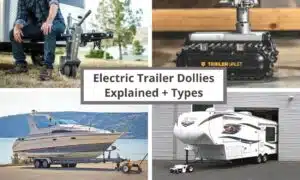
Electric Trailer Dollies Guide: Easily Move RVs and Boats

33 Awesome RV Gift Ideas for Any Budget: Holiday Gift Guide 2022

Blix Packa Genie Cargo Ebike Review

Blix Vika+ Flex Folding Ebike Review

37 Awesome RV Gift Ideas for Any Budget | Holiday Gift Guide 2021

What’s the Best RV Internet Setup? 2024 Update

Flux EM1 Electric Moped Review For RV Travelers

Vika + Electric Folding e-Bike Review and Video

PepperBall LifeLite Self Defense Pepper Ball Gun

21+ Unique Gift Ideas for RVers & Travelers

Lithium Vs Lead Acid Batteries in Cold Temps

Our Fave Gear for RV Living & Nifty Gift Ideas
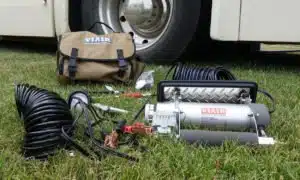
VIAIR 450P-RV Portable Automatic Air Compressor Review
Sign up for our email newsletter with the latest RV park reviews, news and updates.
GOT COMMENTS OR QUESTIONS?
We would love to hear from you. Drop us a note in the comments section below.

16 thoughts on “CarGenerator and Your Vehicle Can Power Home, RV, Emergency”
Why is there a 80 hour limit? You have power for up to 80 hours.
The 80 hour limit is based on an estimate on the size of the vehicle fuel tank. The fuel in the vehicle is the limiting factor. If you continued to add fuel, the time will increase accordingly.
We live “off grid” in the Arizona desert. We have a 48v system consisting of 12 4v batteries. Our solar panels are in need of major upgrades and rewire. Would this cer generator be sufficient to keep our batteries charged during this renovation period? Would the batteries need to be disconnected from the system during charging?
Hi Michael,
Sounds like a cool off grid system. I would recommend you reach out directly to the company to answer this question, including the total size of your system and your current power needs. I expect that there is a way to use this tool for your power needs during your renovation, and you will have the bonus of having it as a backup in case there is an unexpected need in the future. -M
Quite the cost for an inverter.
The company does offer the opportunity to buy just the inverter for far less than the full kit if you want to build your own DIY solution, and another mid-way option of the inverter and a carry case for dry conditions only. We just like the idea of the complete package. -M
I thought idling a car engine for long periods of time was bad for the engine – carbon build up etc.
If you’re in an emergency situation and you need to run it for extended periods of time – say for keeping your house warm and refrigerator going during a hurricane or other major storm – that situation (safety) would presumably take priority over potential impact on the vehicle idling. If using for recharging RV batteries, or say cooking something, you would not need to run the engine for too long of a period. We expect most people would find this a useful backup power source, and use for shorter periods as needed.
Interesting idea! Calling it a “generator” is just confusing, because it’s actually just a large inverter. (Clarifying that it’s a large inverter at the beginning of the article would have helped with understanding.) Of course, depending upon how your trailer electrical connector is hooked up, you may be charging your batteries while driving. Finally, some vehicles have a built-in inverter these days (such as my F150), but many such inverters can’t handle that many amps. This larger inverter would definitely handle more.
While 1000 watts from a quieter source with requires no additional maintenance, etc., is very useful, one of the biggest uses of my Honda generator is running my trailer AC and that requires the 1800 watt generator.
I would also wonder about additional wear on my car’s alternator over time.
Hello Richard, We did point out early in the post that it was an inverter. We called it a ‘generator’ since that is what the company called it, and it does provide power, so we felt it would make sense. Sorry if you found that confusing. And yes, trailers do usually charge their batteries from the towing vehicle while towing, but it is usually a small amount of power because it is transferred via small wires. So you can get much more power into your trailer by using one of these CarGenerator tools. Our Jeep is like your F150 in that it has a built in inverter plug, but as you mentioned, it is not rated for nearly as high of wattage as these external devices. Yes, also as mentioned in the post, we liked our little Honda generator because it could literally run anything in our RV including the air conditioner. But we hardly ever used it for that. If you consistently need the higher wattage provided by your gas generator that would be a different story. Most everything we use when not plugged in at a campground is less than 1,000 watts. Also worth mentioning, if you have a high output alternator and the higher output CarGenerator, you could still run most RV air conditioners with one of these CarGenerators. Interesting curiosity about increased wear on your vehicle. I expect it would be a super tiny impact as vehicle engines are so much more robust, but don’t claim to be an expert on something that technical. -M
Great idea, but where is the connectivity? I only see one picture of the outlets, are there USB -C outputs? 12v? How is it grounded? Pilot lights? Watt meter showing amount drawn? This article is very lean on tech specifications 🤔
Hi Peter, Sorry we didn’t provide the highly detailed technical specs you are looking for. Your level of questions are probably best answered by the manufacturer. Hope you find what you are looking for with them. We were just using it as a consumer, and were impressed with how well it worked, and felt it was worth sharing with our readers. Thanks you. -M
The car generator sounds good but I can’t tell from the article if it will run an RV AC unit. Thanks for clarifying.
Hi there, RV A/C units are almost always more than 1,000 watts especially at startup. But if you have a high output alternator and the larger CarGenerator, you could probably run one a/c, just double check your wattage.
Several years ago, the original Car Generator inspired us to purchase a separate inverter (for a bit less money) and connect it to our car battery. It definitely worked; ours was just not as nicely packaged. Supported a week of quiet boondocking for very little expense. While we have moved on to solar, it’s always in our backup arsenal.
(An alternative, if you have a motorhome with a large alternator and an onboard inverter, is to simply idle your motorhome to replace what the existing inverter draws from your batteries.)
Nice article!
Hi Marv and Terri, Thanks! Yes we remember when you got that original solution! Glad it was a useful tool for you for many years and that you are finding your solar works well too, as well as the peace of mind knowing you have that backup in your arsenal. Hope you guys are doing well!